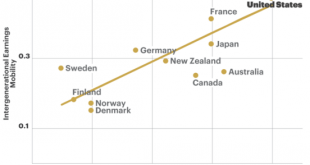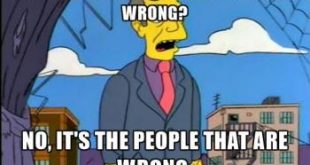from The Atlantic Economists represent this concept with a number they call “intergenerational earnings elasticity,” or IGE, which measures how much of a child’s deviation from average income can be accounted for by the parents’ income. An IGE of zero means that there’s no relationship at all between parents’ income and that of their offspring. An IGE of one says that the destiny of a child is to end up right where she came into the world.
Read More »So much for ‘statistical objectivity’
from Lars Syll Last year, we recruited 29 teams of researchers and asked them to answer the same research question with the same data set. Teams approached the data with a wide array of analytical techniques, and obtained highly varied results … All teams were given the same large data set collected by a sports-statistics firm across four major football leagues. It included referee calls, counts of how often referees encountered each player, and player demographics including team...
Read More »A Tale of Three Classes in the USA
from The Atlantic Saez / Zucman
Read More »The indiscreet aggression of the bourgeoisie
from C. P. Chandrasekhar Neoliberal economic policy—the framework of measures that preaches market fundamentalism but uses the state to engineer a redistribution of income and assets in favour of finance capital and big business—has lost its legitimacy. A huge financial crisis and a decade of recession or low growth, that have hurt most sections except the elite 1 per cent, have convinced the majority in many countries that neoliberalism is no alternative. That change in mood was revealed...
Read More »The mess at the heart of the EU
from Lars Syll The EU establishment has been held to account for the euro mess, for austerity policies that turned recession into depression, for the galloping inequality, and for the millions and millions of unemployed. The EU austerity policies bread understandable and righteous anger — but also ugly far-right xenophobic political movements taking advantage of the frustration that austerity policies inevitably produce. Ultimately this underlines the threats to society that austerity...
Read More »Finding a progressive methodology
from Asad Zaman Ever since the Global Financial Crisis, there have been an increasing number of voices calling for change in the economics curriculum/syllabus. However, even people who are sharply critical of mainstream (Rodrik, Stiglitz, Krugman) merely suggest minor and peripheral changes, and do not question the fundamental methodological basis on which neoclassical economics rests. In fact, a radical paradigm shift is required. According to current nominalist methodology, any model...
Read More »Probability and rationality — trickier than you might think
from Lars Syll The Coin-tossing Problem My friend Bengt says that on the first day he got the following sequence of Heads and Tails when tossing a coin: H H H H H H H H H H And on the second day he says that he got the following sequence: H T T H H T T H T H Which day-report makes you suspicious? Most people I ask this question says the first day-report looks suspicious. But actually, both days are equally probable! Every time you toss a (fair) coin there is the same probability (50 %)...
Read More »Response to “Janus”: Take their intellectual “property”
from Dean Baker For the last four decades, the right has been actively working to rig the rules to undermine progressives both politically and economically. They aren’t just interested in winning an election; they want to destroy any basis for progressive change. This is why they have been so intent on attacking unions. Unlike many centrist Democrats, the right realizes that the labor movement has been at the center of most progressive change in the last century. This is why Reagan made...
Read More »“They aren’t laws of nature”
from David Ruccio Nicola Headlam is, I think, right with respect to “how the rules of the economy are set”: “Somehow, someone, somewhere made these rules up. They aren’t laws of nature.” And they determine “who’s got what and where and why”. The question is, how do we teach economics so that that message gets through? Aditya Chakrabortty [ht: ja] reports on one way of doing it—a makeshift classroom in a converted church, with nine “lay people” and two facilitators (Headlam and Anne Hines,...
Read More »Paul Krugman — a math-is-the-message-modeler
from Lars Syll In a post on his blog, Paul Krugman argues that ‘Keynesian’ macroeconomics more than anything else “made economics the model-oriented field it has become.” In Krugman’s eyes, Keynes was a “pretty klutzy modeler,” and it was only thanks to Samuelson’s famous 45-degree diagram and Hicks’ IS-LM that things got into place. Although admitting that economists have a tendency to use ”excessive math” and “equate hard math with quality” he still vehemently defends — and always has —...
Read More » Real-World Economics Review
Real-World Economics Review






